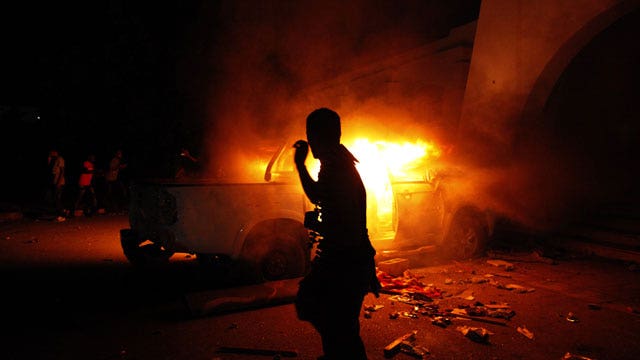Waiting for justice: Benghazi prosecutors want more time
Reaction from Rep. Mike Pompey, member of the House Benghazi Select Committee
The Obama administration promised swift justice after a terrorist attack on the U.S. consulate in Benghazi killed four Americans -- but exactly two years later, the U.S. attorney's office wants more time to prosecute Ahmed abu Khatallah, the only suspect in custody.
"You're dealing with classified information and a terrorist who was part of Al Qaeda for two decades, and so it doesn't surprise me at all that we've ended up in this place," Mike Pompeo, R-Kan., who sits on both the House Intelligence and Benghazi Select committees, told Fox News.
Pompeo said there is no question, based on the classified evidence, that Khatallah played a central role in the attack, but he doubted a lot of that evidence will get into court because it will expose sources as well as methods used by the US intelligence community to collect information.
Ambassador Chris Stevens, Foreign Service Officer Sean Smith, and former Navy Seals Ty Woods and Glen Doherty died in the attack.
Pompeo also warned the delay could be evidence the case is weak and in trouble.
"It shouldn't surprise anyone that when you try and force upon a terrorist a legal system that wasn't meant or intended to deal with crimes committed that night in Benghazi, Libya…I think the results are a mess."
This week, government prosecutors filed a motion to bypass the speedy trial rule, and District Judge Christopher Cooper granted a six-week delay, citing the fact that the attack, the evidence, and the witnesses are overseas.
Khatallah is being held without bail at a detention center in Alexandria, Va.
Former FBI Director Robert Mueller, under whose watch the case was assembled, told the Aspen Security Forum in July that the FBI faced serious blocks in Libya, and the significance of Khatallah’s capture there last June should not be underestimated.
Asked why it took 21 months to grab Khatallah, Mueller implied that it took time to gather evidence and there was only a handful of witnesses against him.
"The environment in Libya, to do an investigation as you know and understand well, was such that it makes it very,very difficult to identify witnesses and then to get two witnesses, and one could assume if you did have witnesses, to try to interview them in places where they would not be killed the next day," Mueller said.
A leading national security analyst, who oversaw the detainee detention programs under President George W. Bush, said he suspects that politics played a role in the timing.
"I think they (the Justice Department and U.S. Attorney’s office) are realizing just like the prosecutors and military commissions have said all along, these cases of overseas captures are hard," said Cully Stimson of the Heritage Foundation.
"When you haven't preserved the crime scene...it takes a long time to develop a case...I think they also may be having witness problems," Stimson added.
"Here it looks to me like they have indicted but they are still building the case at the same time. They are running on parallel tracks, which is not your typical U.S. Attorney's office approach."
“The prosecutors have had pretty good success in cases like this but there will be a case one day when we bring a terrorist to the United States of America,” Pompeo said. “And for whatever reason, the prosecution cannot proceed or a jury cannot convict and at that point we have a terrorist on American soil who can claim all kinds of American constitutional rights.”
And the congressman also warned his concerns go well beyond the courtroom. “There were many other options for making sure that we obtain the intelligence that we have and so this risk is very real and poses a significant risk to America if we continue this course.”
At the time of Khatallah's capture, Attorney General Eric Holder said the case was strong, while also suggesting that evidence collection continued.
"I can say the investigation is still obviously ongoing, but we are in a good place. I think we have a good case," Holder told reporters in July.
"It is always our hope in these kinds of matters to gain, not only actionable intelligence, but also information that can be used in a criminal proceeding, and I think that we were successful in doing that in this matter."
However, a former Pentagon official told Fox News that Khatallah did not provide any actionable intelligence -- or information that the U.S. military and intelligence communities could immediately pursue -- during 10 days of interrogation aboard the USS New York .
Fox News was told that Khatallah only provided background information about the Islamist militant group Ansar al-Sharia, and, significantly, it was known to the FBI agents onboard the ship that “there was a lack of evidence that would be admissible in court,” the former Pentagon official said.
Asked about the case, Mueller's comments suggesting there are only a handful of witnesses, and the requested delay, a spokesman for the U.S. Attorney’s office in Washington said, "Because this is a pending case, and because the investigation is ongoing, we have no comment at this time beyond what has been filed and stated in court."













































